人教7年级下册 Unit 4 知识点讲解 语法讲解
人教版七年级英语下册Unit4 要点详解1

Don ’t eat in class.要点详解1. arrive, reach, get以上三词均可表示“到达、抵达”之意,但用法不同。
arrive 后接at (小地方)或in (大地方——城市、国家)reach 直接连“某地”,get 加to 后再接某地。
如:I arrived in Beijing yesterday.They reached the Great Wall by bus.How can I get to the TV station?若要表示“到家/这儿/那儿”时,用arrive / reach / get 均可。
即:arrive / reach / get home / here / there2. in class 和in the classin class 表示“在上课”,而in the class 表示“在班上”。
Don’t talk in class.上课时不要谈话。
There are 40 students in the class.这个班有40位学生。
类似的短语还有:at table at the table in hospital in the hospital out of question out of the question in front of in the front of 在进餐在桌上(生病等)住院在医院毫无疑问不可能的在……的前面在……的前部⎧⎨⎩⎪⎧⎨⎩⎪⎧⎨⎩⎪⎧⎨⎩⎪3. have to 和mustmust 表示“必须、应该”,是从主观出发的,同时must 意味着一种“责任”与“义务”。
如:We must help our parents do some housework.have to “必须”“不得不”,常表示受外界环境、条件所迫要做的事。
如:There is nothing in the fridge. I have to go shopping now.4. else 其他的else 表示“其他的,此外”,常被置于特殊疑问句、不定代词之后。
(完整版)人教版七年级下英语(unit4)知识点总结全
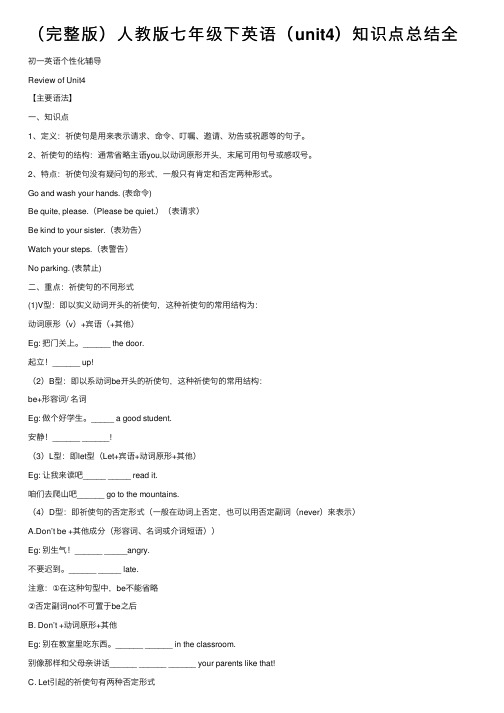
(完整版)⼈教版七年级下英语(unit4)知识点总结全初⼀英语个性化辅导Review of Unit4【主要语法】⼀、知识点1、定义:祈使句是⽤来表⽰请求、命令、叮嘱、邀请、劝告或祝愿等的句⼦。
2、祈使句的结构:通常省略主语you,以动词原形开头,末尾可⽤句号或感叹号。
2、特点:祈使句没有疑问句的形式,⼀般只有肯定和否定两种形式。
Go and wash your hands. (表命令)Be quite, please.(Please be quiet.)(表请求)Be kind to your sister.(表劝告)Watch your steps.(表警告)No parking. (表禁⽌)⼆、重点:祈使句的不同形式(1)V型:即以实义动词开头的祈使句,这种祈使句的常⽤结构为:动词原形(v)+宾语(+其他)Eg: 把门关上。
______ the door.起⽴!______ up!(2)B型:即以系动词be开头的祈使句,这种祈使句的常⽤结构:be+形容词/ 名词Eg: 做个好学⽣。
_____ a good student.安静!______ ______!(3)L型:即let型(Let+宾语+动词原形+其他)Eg: 让我来读吧_____ _____ read it.咱们去爬⼭吧______ go to the mountains.(4)D型:即祈使句的否定形式(⼀般在动词上否定,也可以⽤否定副词(never)来表⽰)A.Don’t be +其他成分(形容词、名词或介词短语))Eg: 别⽣⽓!______ _____angry.不要迟到。
______ _____ late.注意:①在这种句型中,be不能省略②否定副词not不可置于be之后B. Don’t +动词原形+其他Eg: 别在教室⾥吃东西。
______ ______ in the classroom.别像那样和⽗母亲讲话______ ______ ______ your parents like that!C. Let引起的祈使句有两种否定形式a. Let+宾语+not+动词原形+其他Let her not do that.Let’s not think about it. It’s only a waste of time.b. Don’t+ let+宾语+动词原形+其他Don’t let Jim do that.Don’t let us go, please.三、难点:1、特殊形式的祈使句(1)在公共场合的提⽰语中,否定祈使句常⽤“No+名词/ V-ing形式”结构,表⽰“禁⽌做某事”。
人教版七下英语unit4语法知识点

人教版七下英语unit4语法知识
点
wear v.穿着:戴着(状态)接衣帽、饰物等 wear a
skirt/hat/watch wear masks戴口罩 wear a smile面带微笑put on穿上;戴上(动作) Put on your sweater!穿上你的毛衣!
Section A
important adj.重要的 it s important for sb.to do sth.做某事对某人来说是重要的 It's very important for us to wear masks now.现在戴口罩对我们来说是非常重要的。
importance n.重要性 the importance of health健康的重
要性
quiet adj.形容词安静的(修饰n.或放be/系动词后)
quite adv.副词很,非常(相当于very) be quiet/keep quiet/stay保持安静 We have to be/keep quiet in the library.在图书馆里我们必须保持安静
情态动词must表示“必须;务必用法:主语+must+动词原形+其他例句:You must wear the school uniform at school。
Unit 4(单元解读课件)七年级英语下册(人教版)

放学后的活动、家务劳 学校规则过渡到家庭的
动和外出时间等等。
规则。通过对话展示不
词汇或表达:
make
one's
bed,be
strict(withsb.),follow the
rules,
句型:
1. Can we wear a hat in class?
1. 识别听力语 篇的主题、主 旨大意和要点。 2. 捕捉听力中
classroom!
3. 了 解 国 内
2. We can't arrive 外 不 同 的 校
late for class.
规。
第二课时SectionA 2d-3b 课时内容解读
单元主题:人与自我
教语 材篇 板形 块式
语篇内容
语篇意义
核心词汇与句型
技能与策 略学习要
点
第听 二力 课对 时话 Sec tio nA 2d3b
重点词组
句型
(be)on time,dining hall, listen to, have to,go out,do the dishes,make one's bed,be strict(withsb.),follow the rules
Don't eat in the classroom! We can't arrive late for class. We must be on time. Can we wear a hat in class? Yes, we can./No, we can't. We have to clean the classroom. We have to follow the rules.
人教版英语七年级下册-Unit-4-Don't-eat-in-class-语法解析

2021/2/4
1
6
疑问句: must 提前,回答时注意一二人称的互换。肯定用 must, 否定用needn’t. e.g. --Must I go home now?
-- Yes, you must. -- No, you needn’t.
B: And I must clean my room every Saturday. =?
A: Wow, you do have a lot of rules!
2021Dr. Know, There are too many rules! At 6:00 a.m. my mom says, “Get up now and make your bed!”
too many rules “太多的规定”, 其中too many 用来 修饰可数名词复数rules。 e.g. He has too many friends to meet.
修饰不可数名词时, 要用too much e.g. We have too much work to do.
much too 太……much 用来增强语气。后接形容 词或副词。
What can I do. Dr. Know? Molly Brown, New York
表“看”的单词?
either 也。用于否定句和疑问句中。肯定句中用too 表也。
watch,see,look r,read
2021/2/4
1
13
Dear Molly, I know how you feel. People always tell us, “ Don’t do this!” or “You can’t do that!” But think about it, Molly. There are a lot of things you can do. You can play basketball on weekends. You can watch TV after you read a book. Parents and schools are sometimes strict,
人教版七年级下册英语Unit4单元语法知识点总结

人教版七年级下册英语Unit4单元语法知识点总结重要短语具体用法和例句:1. on time:准时,按时。
例如:I always arrive at school on time.(我总是按时到达学校。
)2. listen to…:听……。
例如:She likes to listen to music.(她喜欢听音乐。
)3. in class:在课上。
例如:We should pay attention in class.(我们在课上应该注意听讲。
)4. be late for:做……迟到。
例如:Don't be late for the meeting.(不要开会迟到。
)5. have to:不得不。
例如:I have to finish my homework before going out.(我不得不做完作业再出去。
)6. be quiet:安静。
例如:Please be quiet in the library.(在图书馆请保持安静。
)7. go out:外出。
例如:I like to go out with my friends on weekends.(我喜欢周末和朋友们出去。
)8. do the dishes:清洗餐具。
例如:It's your turn to do the dishes.(轮到你清洗餐具了。
)9. make breakfast:做早饭。
例如:My mom makes breakfast for me every morning.(我妈妈每天早上为我做早饭。
)10. make (one’s) bed:铺床。
例如:You should make your bed by yourself.(你应该自己铺床。
)11. be noisy:吵闹。
例如:The children are being noisy.(孩子们很吵闹。
)12. keep one’s hair short:留短发。
(完整版)人教版英语七年级下册第四单元短语语法知识点总结及练习

(完整版)人教版英语七年级下册第四单元短语语法知识点总结及练习Unit 4Don’t eat in class【短语归纳】1.on time 准时,按时2. listen to …听……3. in class 在课上4. be late for 做……迟到5. have to 不得不6. be quiet安静7. go out外出8. do the dishes 清洗餐具9. make breakfast 做早饭10. make (one’s) bed 铺床11. be noisy 吵闹12. keep one’s hair short 留短发13. play with sb. 和某人一起玩14. play the piano 弹钢琴15. have fun 玩得高兴16. make rules 制订规则【用法集萃】1.Don’t + 动词原形+其他,不要做某事。
2.help sb. (to) do sth. 帮助某人做某事3.too many + 可数名词复数太多的……4.practice doing sth. 练习做某事5. be strict with sb. 对某人要求严格6. be strict in sth. 对某事要要求严格7. leave sth sp. 把某物忘在某地8. keep + 宾语+形容词使……保持某种状态9. learn to do sth. 学会做某事10. have to do sth. 不得不做某事┃语法探究┃┃.祈使句定义:用于表达命令、请求、劝告、警告、禁止等的句子叫__________句。
时态:使用______________时态。
结构:动词原形+其他成分+please. 否定祈使句在动词原形前面加__________ 。
如:Be quiet in the classroom, please.在教室里请保持安静。
Don't fight. 不要打架┃.情态动词have to 和must1.情态动词have to和must都表示“__________”的意思。
七年级英语下人教版Unit4语法知识详解
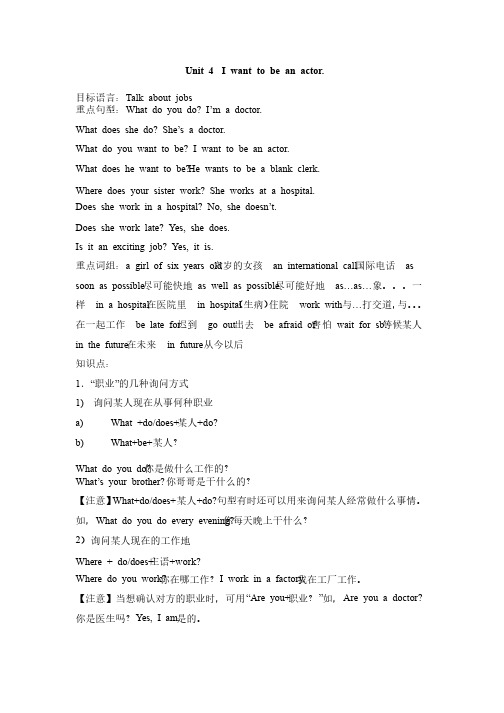
Unit 4 I want to be an actor. 目标语言:Talk about jobs 重点句型:What do you do? I’m a doctor.What does she do? She’s a doctor.What do you want to be? I want to be an actor. What does he want to be? He wants to be a blank clerk. Where does your sister work? She works at a hospital. Does she work in a hospital? No, she doesn’t.Does she work late? Yes, she does. Is it an exciting job? Yes, it is. 重点词组:a girl of six years old 六岁的女孩六岁的女孩 an international call 国际电话国际电话国际电话 as soon as possible 尽可能快地尽可能快地 as well as possible 尽可能好地尽可能好地尽可能好地 as…as…象。
一样 in a hospital 在医院里在医院里在医院里 in hospital (生病)住院住院 work with 与…打交道,与。
在一起工作在一起工作 be late for 迟到迟到迟到 go out 出去出去 be afraid of 害怕害怕害怕 wait for sb.等候某人等候某人 in the future 在未来在未来 in future 从今以后从今以后知识点:知识点:1.“职业”的几种询问方式的几种询问方式1) 询问某人现在从事何种职业询问某人现在从事何种职业a)What +do/does+某人+do? b) What+be+某人?某人?What do you do?你是做什么工作的?你是做什么工作的?What What’s your brother? ’s your brother? 你哥哥是干什么的?你哥哥是干什么的?【注意】What+do/does+某人+do?句型有时还可以用来询问某人经常做什么事情。
人教版英语七年级下册 Unit 4 语法精讲
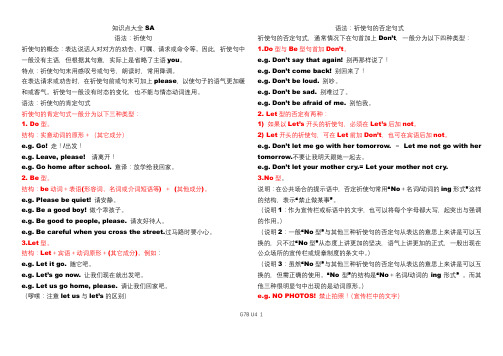
知识点大全SA语法:祈使句祈使句的概念:表达说话人对对方的劝告、叮嘱、请求或命令等。
因此,祈使句中一般没有主语,但根据其句意,实际上是省略了主语you。
特点:祈使句句末用感叹号或句号,朗读时,常用降调。
在表达请求或劝告时,在祈使句前或句末可加上please,以使句子的语气更加缓和或客气。
祈使句一般没有时态的变化,也不能与情态动词连用。
语法:祈使句的肯定句式祈使句的肯定句式一般分为以下三种类型:1. Do型。
结构:实意动词的原形+(其它成分)e.g. Go! 走!/出发!e.g. Leave, please! 请离开!e.g. Go home after school. 意译:放学给我回家。
2. Be型。
结构:be动词+表语(形容词、名词或介词短语等) +(其他成分)。
e.g. Please be quiet! 请安静。
e.g. Be a good boy! 做个乖孩子。
e.g. Be good to people, please. 请友好待人。
e.g. Be careful when you cross the street.过马路时要小心。
3.Let型。
结构:Let+宾语+动词原形+(其它成分)。
例如:e.g. Let it go. 随它吧。
e.g. Let’s go now. 让我们现在就出发吧。
e.g. Let us go home, please. 请让我们回家吧。
(啰嗦:注意let us与let’s的区别)语法:祈使句的否定句式祈使句的否定句式,通常情况下在句首加上Don’t,一般分为以下四种类型:1.Do型与Be型句首加Don’t。
e.g. Don’t say that again! 别再那样说了!e.g. Don’t come back! 别回来了!e.g. Don’t be loud. 别吵。
e.g. Don’t be sad. 别难过了。
e.g. Don’t be afraid of me. 别怕我。
人教版七年级下册英语Unit 4 知识点语法归纳总结

Unit 4 Don’t eat in class.1.短语归纳2.典句必背3.用法集萃(1)Don’t arrive late for class. 不要上课迟到❖arrive in❖arrive at(2)You must be on time. 你必须准时。
❖on time是固定搭配,意为“按时;准时”。
例:Don’t worry. The train will arrive on time. 别担心。
火车会准时到达的。
❖常见的time短语(3)Don’t listen to music in class. 不要上课时听音乐牛刀小试—Do you like the songs by Taylor?一Yes. Country music ______ nice and full of feelings.A. SoundsB.listensC. hearsD. looks(4)This is very important. 这是很重要的❖important作形容词,意为“重要的”。
如:The first lesson is very important. 第一课是很重要的❖反义词:unimportant adj. 不重要的❖派生词:importance n. 重要;重要性(5)Can we bring music players to school? 我们可以把音乐播放器带到学校里来吗?❖bring作动词,意为“带来;拿来”例:Don’t forget to bring your homework here. 不要忘记把你的家庭作业带过来❖辨析bring, take, carry和get牛刀小试Don’t forget _____ your photos here when you come to school.A.bringingB. to takeC. takingD. to bring(6)Oh, and we also have to be quiet in the library. 哦,我们在图书馆里还必须保持安静❖quiet作形容词,意为“安静的”,可以用来修饰人,也可以用来形容地点或场所等。
七年级下册Unit 4 人教版英语中考一轮复习(词汇+语法讲解)

一轮复习:七下U4 词汇+语法讲解【单词默写】【单词变形】【单词变性】dirty形容词变名词_________________ important形容词变名词_________________ noisy形容词变名词_________________terrible形容词变副词_________________quiet形容词变副词_________________luck名词变形容词_________________arrive动词变名词_________________feel动词变名词_________________follow动词变名词_________________keep动词变名词_________________learn动词变名词_________________listen动词变名词_________________read动词变名词_________________【一词多义】1. read ____________ _______________ __________________ Students like to read books in the library.Could you read the words for me?Mary read the degree of the use of electricity every month.There is a note on the door, which reads, “No knocking.”【词汇用法】1. important: adj./important +n./it is important for sb. to do sth.2. sorry: adj./be sorry to do sth./feel sorry to do sth./I’m sorry to hear that3. strict: adj./be strict with sb./be strict at sth./a strict teacher4. rule: n./classroom rules/traffic rules/follow the rules/break the rules/keep the rules5. arrive: v./arrive at/arrive in sp.近义词辨析: arrive vs. get to vs. reacharrive: v./arrive at/arrive in sp.get to: v./get to sp.reach: v./reach sp.6. bring: vt./bring sb. sth./bring sth. to sb.1) bring的短语:bring up_______________bring out_______________ bring in_______________2) 近义词辨析: bring vs. take vs. get vs. fetch vs. carrybring: bring sb. sth./bring sth. to sb./bring out/bring up/bring intake: take sth. to sb./sp.get: get sth. from sb./sp.fetch: fetch sth.carry: carry sth.7. feel: v./feel +adj./feel like doing sth.相关词辨析: sound vs. look vs. taste vs. smell vs. feelsound: sound+adj.look: look+adj.taste: taste+adj.smell: smell+adj.feel: feel+adj.8. follow: vt./follow sb./be followed by/follow the rules9. keep: vt./keep (on) doing sth./keep sb. from doing sth./keep+adj./keep a pet/keep sth.相关词辨析: keep vs. stay vs. remainkeep: v./keep +adj.stay: v./stay +adj.remain: v./remain +adj.近义词辨析: keep vs. borrow vs. lendkeep: vt./keep sth./表延续性意义borrow: vt./borrow sth. from sb./表借来,表短暂lend: vt./lend sth. to sb./表节奏,表短暂keep的短语:keep up_____________________keep up with____________________ keep in touch_____________________10. learn: vt./learn sth. from sb./learn sth.11. listen: vi./listen to sth.近义词辨析: sound vs. listen to vs. hearsound: v./sound +adj./表状态listen to: v./listen to sb./sth./表过程hear: v./hear sth./hear about/hear of/hear from/hear sb. do/doing sth./表结果12: remember: remember to do sth./remember doing sth.相关词辨析: stop vs. continue vs. forget vs. rememberstop: stop to do/stop doingcontinue: continue to do/continue doingforget: forget to do/forget doingremember: remember to do/remember doing13. wear: wear clothes/a necklace/a watch/a pair of glasses/a smile近义词辨析: dress vs. put on vs. wear vs. be on vs. be indress: vt./dress oneself/dress sb./be dressed in/get dressed input on: vt./put on sth./表示动作wear: vt./ wear clothes/a necklace/a watch/a pair of glasses/a smile表示状态be on: sth. be on sb.be in: sb. be in sth.14. fight: vi./fight for sb./fight against sb./fight with sb.15. practice: vi./practice doing sth.【攻占语法】句型(祈使句)1. 祈使句的形式: 以__________________________开头的句子, 或者No+doing/n.2. 祈使句的否定: 在句子前+ _____________________________________ be quiet!______________ talk loudly at school!3. 对比Jane, _______________(close) the door._________________(close) the door, Jane.Jane ____________(close) the door.4. 祈使句的反义疑问句:Be quiet, _________________________?Stop talking, ___________________________?Let’s have a party, _______________________?Let us have a party, __________________________?【词汇练习】1.We will a ________ at the train station in an hour.2.As the old saying goes, “Old habits die hard.” So start exercising b ________ it’s too late.3.As an excellent teacher, he is always trying his best to b_______ out the best in his pupils.4.Tom, your clothes are d ________. You’d better wash them.5.Julia helps her mom do the d ________ after meals every day.6.Peter has too many rules at home and at school. I know how Peter f ________.7.He often f ________ with others. People say he is not friendly.8.It’s not difficult to f ________ the rules, if you know they are helpful.9.As kids, we always f ________ for toys in the kindergarten, but now we’re pretty good friends.10.The little girl always keeps her h ________ short, just like a boy.11.Being polite to others is very i ________. It shows who you are.12.Although Martin is 70 years old, he still k ________ active in sports.13.Mother was cooking in the k ________ when I came home.14.What’s Bo doing? He is l ________ to play the guitar.15.Tom, l ________ carefully to what the teacher says.16.We have 30 books on the teacher’s desk, but there are 35 students in our class. We need 5 m ________ books.17.Who is talking n ________ right now in the classroom?18.I forgot to take o ________ the rubbish for Mum when I left home this morning.19.When we go o ________, we often take cameras to take photos.20.Remember to p ________ speaking English every day.21.Don’t talk, Alan. You must be q ________ in the library.22.People can enjoy r ________ many books online with the first “WeChat library” in Hangzhou.23.We have too much homework to do every day. But after that, we can r ________.24.R ________ to call 110 when you are in danger.25.Remember the r ________, and don't break them.26.I’m very s ________ for using your computer without asking.27.My father is s ________ with me, but I love him and listen to him.28.I am t________ sorry for what I have done.29.It’s Sunday today, so you don’t need to wear your school u ________.30.The little girl’s always w ________ a dress in the summer. She doesn’t like trousers.【语法练习】1._____ (check)your composition carefully, and some spelling mistakes can be avoided.2.____(keep) the window open, it’s so hot in the room.3._______ (find) ways to get on well with your classmates, or you will get yourself very lonely.4._____ (work) hard and you’ll make progress in English.5.________ (let) me go! It’s of importance for me.6.______(try) your best, I think, and you can work out the problem easily.7.Jane, ______________(work) hard and you’ll make great progress in English.8.Mark, _______________(dress) yourself quickly. It’s time for school.9.Mary ________________(take) her homework to school.10.Hey, Little boy, _______________(pick) up that rubbish.【参考答案】dirty形容词变名词dirtimportant形容词变名词importancenoisy形容词变名词noiseterrible形容词变副词terriblyquiet形容词变副词quietlyluck名词变形容词luckyarrive动词变名词arrivalfeel动词变名词feelingfollow动词变名词followingkeep动词变名词keeperlearn动词变名词learnerlisten动词变名词listenerread动词变名词reader1. read 阅读朗读读数写着Students like to read books in the library.Could you read the words for me?Mary read the degree of the use of electricity every month. There is a note on the door, which reads, “No knocking.”6. bring: vt./bring sb. sth./bring sth. to sb.1) bring的短语:bring up抚养长大bring out带出来bring in引进9. keep: vt./keep (on) doing sth./keep sb. from doing sth./keep+adj./keep a pet/keep sth.相关词辨析: keep vs. stay vs. remainkeep: v./keep +adj.stay: v./stay +adj.remain: v./remain +adj.近义词辨析: keep vs. borrow vs. lendkeep: vt./keep sth./表延续性意义borrow: vt./borrow sth. from sb./表借来,表短暂lend: vt./lend sth. to sb./表节奏,表短暂keep的短语:keep up坚持keep up with与某人并驾齐驱keep in touch保持联系1. 祈使句的形式: 以动词原形开头的句子, 或者No+doing/n.2. 祈使句的否定: 在句子前+ don’tDon’t be quiet!Don’t talk loudly at school!3. 对比Jane, close(close) the door.Close close) the door, Jane.Jane closes(close) the door.4. 祈使句的反义疑问句:Be quiet, don’t you?Stop talking, don’t you?Let’s have a party, shall we?Let us have a party, will you?【词语练习】Arrive before bring dirty dishes feels fights follow fought hair important keeps kitchen learning listen more nosily out outside practice quiet reading relax remember sorry strict terribly uniform wears【语法练习】Check Keep Find Work Let Try Work Dress takes pick。
Unit4重难点讲解与练习人教版七年级英语下册

人教版七年级英语下册Unit 4 Don’t eat in class一、重点讲解1.Don’t do sth. 不要做某事,祈使句的否定句。
2.in class上课,in the class在课室。
注意:有the 和没the的区别。
te adj. 迟的、晚的,如:be late, be late for sth;adv.修饰行为动词,放行为动词后, 如:arrive late for, work late,get up late 等。
如:1)I am sorry I am late. 对不起,我迟到了。
2)She is late for class. 她上课迟到了。
4.fight 打架,拓展:fight with sb. 与某人打架5.practice +n/ doing sth. 练习某事/做某事6.get sth for sb. 为某人拿某物,get指“去拿来”7.noisy adj. 嘈杂的;喧闹的拓展:noise n. 噪音; make noise制造噪音8.keep (my)hair short 留短发拓展:keep sth. adj. 使某物保持…(的状态);keep sb. doing… 使某人一直做…二.同步句型&讲解1.What are the rules? We must be on time for class. 规章制度是什么?我们必须按时上课。
讲解:on time按时; in time及时2.We also have to be quiet in the library.而且我们在图书馆必须安静。
讲解:also 也,放在肯定句句中(行前be后)。
3.There are too many rules. 有太多的规章制度。
讲解:too many +可数名词复数:太多4.Don’t leave the dirty dishes in the kitchen.别把脏盘子留在厨房。
完整word版人教版七年级下册英语Unit4知识点

Unit4名词:dish 碟;盘luck 幸运;运气rule 规则;规章头发hair hall 大厅;礼堂厨房kitchen动词:follow 遵循;跟随arrive 到达relax 放松;休息keep listen 听读;阅读read 保持;保留feel 感受;觉得学习;学会learn wear 穿;戴记住带来;取来remember bring形容词:严格的;严厉的strict 脏的dirty sorry 抱歉的;难过的吵闹的noisy important 重要的非常讨厌的;可怕的terrible 安静的quiet副词:外出out兼类词:更多的adj&pron more 打架;战斗fight v&npractice 以前adv 在……以前;prep&conj before v&n 练习外面的adj outside adv 在外面短语:on time be()准时清洗餐具do the dishes铺床make one's bed 餐厅dining hallfollow the rules listen to 听遵守规则必须;不得不have to 对某人要求严格be strict with sb 外出(娱乐)go out知识点:规则、1rule 可数名词校规school rules 班规class rules家规family rules 交通规则traffic rules制定规则make the rules违反规则break the rules 遵守规则follow the rulesarrive 到达2、arrive at + 小地方大地方arrive in +到那到家/到这/arrive home/here/thereI usually arrive at the bus station at 6:30 every morning. 我通常在每天早上六点半到达公交车站。
最全面人教版七年级下册英语第四单元知识点归纳总结
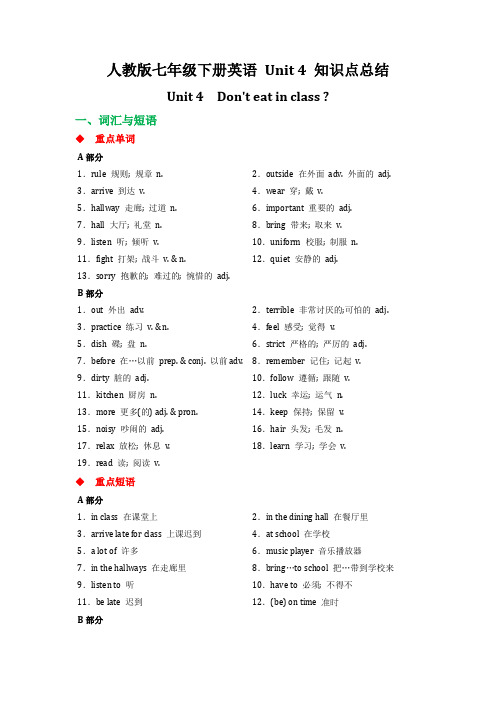
人教版七年级下册英语Unit 4 知识点总结Unit 4 Don't eat in class ?一、词汇与短语◆重点单词A部分1.rule 规则; 规章n.2.outside 在外面adv. 外面的adj. 3.arrive 到达v.4.wear 穿; 戴v.5.hallway 走廊; 过道n.6.important 重要的adj.7.hall 大厅; 礼堂n.8.bring 带来; 取来v.9.listen 听; 倾听v.10.uniform 校服; 制服n. 11.fight 打架; 战斗v. & n.12.quiet 安静的adj.13.sorry 抱歉的; 难过的; 惋惜的adj.B部分1.out 外出adv.2.terrible 非常讨厌的;可怕的adj. 3.practice 练习v. & n.4.feel 感受; 觉得v.5.dish 碟; 盘n.6.strict 严格的; 严厉的adj. 7.before 在…以前prep. & conj. 以前adv.8.remember 记住; 记起v. 9.dirty 脏的adj.10.follow 遵循; 跟随v. 11.kitchen 厨房n.12.luck 幸运; 运气n.13.more 更多(的) adj. & pron.14.keep 保持; 保留v. 15.noisy 吵闹的adj.16.hair 头发; 毛发n.17.relax 放松; 休息v.18.learn 学习; 学会v.19.read 读; 阅读v.◆重点短语A部分1.in class 在课堂上2.in the dining hall 在餐厅里3.arrive late for class 上课迟到4.at school 在学校5.a lot of 许多6.music player 音乐播放器7.in the hallways 在走廊里8.bring…to school 把…带到学校来9.listen to 听10.have to 必须; 不得不11.be late 迟到12.(be) on time 准时B部分1.too many 太多的2.go out 外出(娱乐)3.on school nights 在上学期间的晚上4.practice the guitar 练习吉他5.do the dishes. 清洗餐具6.make breakfast 做早饭7.make one's bed 铺床8.read a book 看书9.think about 考虑10.be strict (with sb.) (对某人)要求严格11.follow the rules 遵守规则12.good luck 祝好运◆重点句子A部分1.Don't arrive late for class. You must be on time. 不准上课迟到,务必守时。
Unit4 单元知识点总结课件--七年级英语下册(人教版)

No+ 动词-ing 禁止做某事
No smoking.
Let sb not do sth
让…不要做某事
Let them not go.
相关链接: Let’s+动词原形 Vs. Let us+动词原形
Let us+动词原形:通常不包括听话者在内;省略主语you Let us watch TV. (“你让我们”;说话者和听话者不一起)
2.___________exercising, and you’ll be healthier.
A.Keep
B.To keep
3.Jack, ___________here, and I will give you a present.
A.comes
B.come
4. _____ quiet, please. We are in the reading room.
have to
强调客观需要 有人称/时态变化 It’s too late. We have to go home now.
单项选择
1.——Hey, Ted! You ___________never play in the street. It’s not safe.
——Sorry, Mum. I won’t again.
—— OK! I’ll be there soon.
A.fetch
B.take
C.bring
3.It’s cold outside. You should ___________a coat with you.
A.bring
B.take
C.get
4.—— I’m sorry I left my homework at home. Must I go and ___________it?
七年级下unit4重点知识点

七年级下unit4重点知识点七年级下Unit 4重点知识点本篇文章将系统地讲述七年级下Unit 4的重点知识点,包括语法、词汇等方面的内容。
希望能够帮助大家更好地掌握这个单元的知识。
一、语法1. 一般过去时在一般过去时中,动词要变成过去式。
其中,大多数动词在词尾加-ed,如:walked、played等。
但也有一些不规则动词需要特别记忆,如:go-went、have-had等。
在句子结构上,一般过去时通常需要使用时间状语,如:yesterday、last week等。
2. 现在完成时现在完成时表示过去某个时间发生的事情对现在的影响。
构成方式为“have/has+动词的过去分词”。
例如,“I have seen this moviebefore.” 中的seen就是过去分词。
在句子中,现在完成时也通常需要使用时间状语,如:ever、never等。
3. 一般将来时一般将来时表示将要发生的事情。
构成方式为“will/shall+动词原形”。
例如,“I will go to Beijing tomorrow.” 中的will表示将来时。
另外,一般将来时还可以通过be going to+动词原形的形式来表示。
二、词汇1. 基本词汇本单元的基本词汇包括:waiter、menu、dish、salad、steak、seafood、order、bill、tip等。
这些词汇都与餐厅用餐有关。
2. 重点词汇除了基本词汇外,还有一些重点词汇需要注意掌握。
例如:(1) 常见的动词短语:make a decision、take a vacation、get together等。
(2) 形容词:delicious、terrible、expensive、cheap等。
(3) 副词:usually、sometimes、always等。
(4) 其他词汇:healthy、hungry、thirsty等。
三、阅读理解本单元的阅读理解主要涉及餐厅用餐和旅游方面的内容。
人教版初中英语7年级下册unit4知识清单+习题 (附解答)
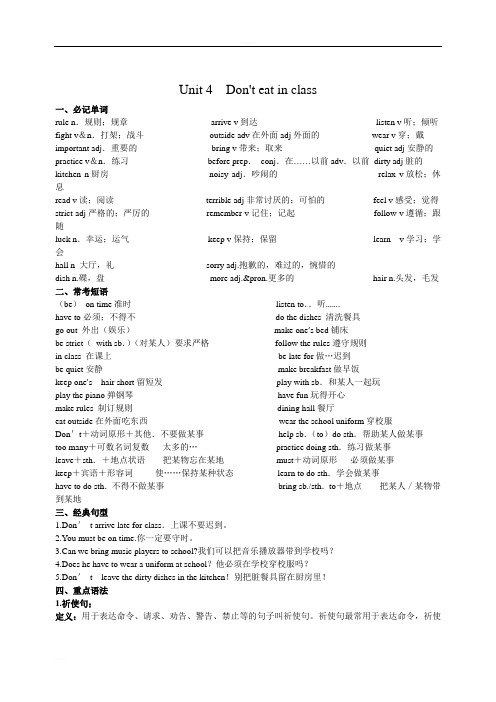
Unit 4 Don't eat in class一、必记单词rule n.规则;规章arrive v到达listen v听;倾听fight v&n.打架;战斗outside adv在外面adj外面的wear v穿;戴important adj.重要的bring v带来;取来quiet adj安静的practice v&n.练习before prep.conj.在……以前adv.以前dirty adj脏的kitchen n厨房noisy adj.吵闹的relax v放松;休息read v读;阅读terrible adj非常讨厌的;可怕的feel v感受;觉得strict adj严格的;严厉的remember v记住;记起follow v遵循;跟随luck n.幸运;运气keep v保持;保留learn v学习;学会hall n 大厅,礼sorry adj.抱歉的,难过的,惋惜的dish n.碟,盘more adj.&pron.更多的hair n.头发,毛发二、常考短语(be)on time准时listen to..听…….have to必须;不得不do the dishes 清洗餐具go out 外出(娱乐)make one’s bed铺床be strict(with sb.)(对某人)要求严格follow the rules遵守规则in class 在课上be late for做…迟到be quiet安静make breakfast做早饭keep one’s hair short留短发play with sb.和某人一起玩play the piano弹钢琴have fun玩得开心make rules 制订规则dining hall餐厅eat outside在外面吃东西wear the school uniform穿校服Don't+动词原形+其他.不要做某事help sb.(to)do sth.帮助某人做某事too many+可数名词复数太多的…practice doing sth.练习做某事leave+sth.+地点状语把某物忘在某地must+动词原形必须做某事keep+宾语+形容词使……保持某种状态learn to do sth.学会做某事have to do sth.不得不做某事bring sb./sth.to+地点把某人/某物带到某地三、经典句型1.Don't arrive late for class.上课不要迟到。
Unit4知识归纳人教版七年级英语下册

Unit 4短语归纳1.(be)on time 准时2.be on time for sth 准时做.... be on time for class 准时上课3. listen to...听4.in/after class在课上/下5. arrive/be late for 迟到Arrive late for class = be late for class 上课迟到6. be quiet =keep quiet 安静7. go out 外出(娱乐)8. do/wash the dishes 清洗餐具9.make breakfast 做早饭10. make one's/the bed 铺床11. be strict with sb. 对某人要求严格be strict about / in sth. 对某事要求严格12. keep one's hair short 留短发13. play with sb. 和某人一起玩14.play the piano 弹钢琴15.have fun 玩得开心16.make rules 制定规则17. follow the rules 遵守规则18. dining hall餐厅19.eat outside在外面吃20. wear the school uniform 穿校服21.in the hallways在走廊里22. good luck好运23. bring sb./sth. to+地点把某人/某物带到某地24. think about 考虑;思考用法集萃1.Don't+动词原形+其他. 不要做某事。
2. help sb. (to ) do sth. 帮助某人做某事3. too many+可数名词复数太多的too much +不可数名词太多的.much too+形容词/副词太...4. practice/practise doing sth. 练习做某事5. leave + sth.+地点状语把某物忘/留在某地动词短语:leave the dirty dishes in the kitchen 把脏碗留在厨房6. keep+宾语十形容词使.….保持某种状态7. learn to do sth. 学会做某事8. have to do sth. 不得不做某事don’t / doesn’t have to do sth 不必做某事9. remember to do sth. 记得要做某事remember doing sth. 记得做过某事10.have fun doing sth. 做某事很开心11.keep + 宾语(人称代词宾格)+ 形容词使...保持某种状态Keep them happy ! 使他们保持开心!12.It’s best to do sth. 做...是最好的。
七年级英语下册 Unit 4 Don’t eat in class短语、语法知识点汇总 (新版)人教新目标版

Unit 4 Don’t eat in class 一、基础归纳【教材内容解析】Section A1.Don’t arrive late for class. (P. 19)arrive作不及物动词,表示“到达”,接宾语时,需要加上介词in或者at。
When did you arrive?We are arriving at the station at two o’clock.【拓展】reach表示“到达”时,是及物动词,后面直接接表示地点的名词作宾语。
另外两个表示“到达”的动词(get和arrive)都是不及物动词,get to+地点;arrive in/at+地点。
After a long way, they reached/got to/arrived at the top of the mountain finally.2.You must be on time. (P. 19)on time用作固定短语,表示“准时、按时”,in time表示“及时”。
The train arrives on time.The ambulance(救护车) arrives in time.3.Don’t listen to music in class. (P. 19)listen用作不及物动词,表示听的动作,后接宾语时,需要加上介词to,hear强调听的结果,表示“听到”。
This girl likes to listen to music.Can you hear anything?4.Don’t fight. (P. 19)fight此处用作动词,意为“打架”,fight with sb.意为“与某人打架”。
Why do you sometimes fight with others?5.listen to music outside (P. 20)outside表示“在外边”,反义词为inside“在……里面”。
- 1、下载文档前请自行甄别文档内容的完整性,平台不提供额外的编辑、内容补充、找答案等附加服务。
- 2、"仅部分预览"的文档,不可在线预览部分如存在完整性等问题,可反馈申请退款(可完整预览的文档不适用该条件!)。
- 3、如文档侵犯您的权益,请联系客服反馈,我们会尽快为您处理(人工客服工作时间:9:00-18:30)。
Unit 4 Don’t eat in class.
Section A
1.rule <Cn.> 规则;规章复数:________
名词短语:
school/class/family/traffic rules校规/班规/家规/交通规则
= the rule(s) of school/class/family/traffic校规/班规/家规/交通规则
动词短语:
make a rule = make rules制定规则
follow/obey the rules遵守规则
break a rule违反规则
Eg: Everyone should follow class rules.
=Everyone should follow the rules of the class. 每个人都应该遵守班规。
2.arrive <vi.>到达
arrive late for = be late for迟到前者侧重动作,后者侧重状态。
Eg: Don’t arrive late fo r the meeting next time. 下次开会别迟到了
=Don’t be late for the meeting next time.
复习:arrive,reach与get
特殊:get home/here/there
arrive home/here/there
Eg: I get to Beijing. 我到北京啦。
= I arrive in Beijing.
= I reach Beijing.
Eg: Tom always ____________________ his office on time.汤姆总是按时到办公室。
We _________________to school at 7:00 every morning.我们每天早上7点到校。
3. 辨析:on time与in time
Eg: The train arrives on time.火车准时到达。
Firemen reaches the house on fire in time.消防员及时赶到那幢失火的房子处。
4. listen <vi.> 听
强调听的动作,后接宾语时,需加介词to:listen to...
Eg: Please listen carefully.
I like listening to music after school.
5.in class 在课上
after class 在课后(此处class是“课堂”的意思)
Eg: Let’s talk about singer after class.
拓展:in the class 在班级里(此处class是“班级”的意思)
in the classroom 在教室里
Eg: There are 40 students in the class/classroom.
6.fight
(1)<v.> 打架;战斗
① fight with sb. 与某人打架
Eg: My mother tells me not to fight with others.
① fight for “为…而战斗”
Eg: They fight for peace. 他们为和平而战。
① fight about “因…而争吵/争论”
Eg: Don’t fight about small things.
(2)<n.>打架
have a fight(with…) 意为“(和…)打架”
Eg: Tom had a fight with his brother last night.
7.outside <adv.> 在外面
反义词:________
Eg: Don’t stay inside all the time.Let’s go outside to play!
别一直呆在屋里,咱们去外面玩吧。
① <adj.> 外面的
Eg: Outside workers need warm clothes in winter.
① <prep.> 在…外面;向…外面
Eg: There is a new car outside the house.
① <n.> 外部;外表
Eg: The outside of the house is red.
8. important <adj.> 重要的
反义词:____________ 名词形式:_____________① 作表语
It is important for sb. to do sth. 做某事对某人来说是重要的
Eg: It is important for us ________(learn) English well.
① 作定语
Eg: There is an important meeting this afternoon.
9.辨析:have to与must+动词原形(情态动词)
Eg: I have to study hard. 我不得不努力学习。
I must study hard. 我必须努力学习。
You don’t have to tell him about it. 你没必要把这件事情告诉他。
You mustn’t tell him about it. 你一定不要把这件事情告诉他。
10.bring <vt.> 带来;取来
bring sth./sb. to… 把某物/某人带到…
Eg: Please bring the book to me.
辨析:bring, take与get
Eg: Please _______ your book here.
The girl _______ the apple away.
My coat is in the next room. Can you ______ it for me?
11.quiet <adj.> 安静的
反义词:_______ 副词形式:__________
Eg: I open the door _______. (quiet) 我悄悄的打开门。
① 作表语be quiet = keep quiet 保持安静
Eg: Be/ Keep quiet, please! My baby is sleeping.
② 作定语
Eg: He lives in a quiet place.
12. 语法:祈使句
祈使句:用来表示请求,命令,劝告或建议等语气的句子。
由于祈使句的主语是第二人称,因此通常省略号主语,以动词原形开头。
(1)肯定祈使句
注意:有时可在祈使句的句首或句尾加上please,使语气显得客气、有礼貌。
如果在句尾加please,应该用逗号与前句隔开。
Eg: Go this way, please. 请这边走。
Please stand up. 起立!
(2)否定祈使句
13. 语法: must / have to / can (1)must / have to
(2)can;
“能、会” 否定: can’t / cannot
①其后加动词原形,无人称和数的变化Eg: She can play the piano.
②变否定加not; 变疑问,要提前。
Eg: Lily can’t play basketball.
Can you help me?。
